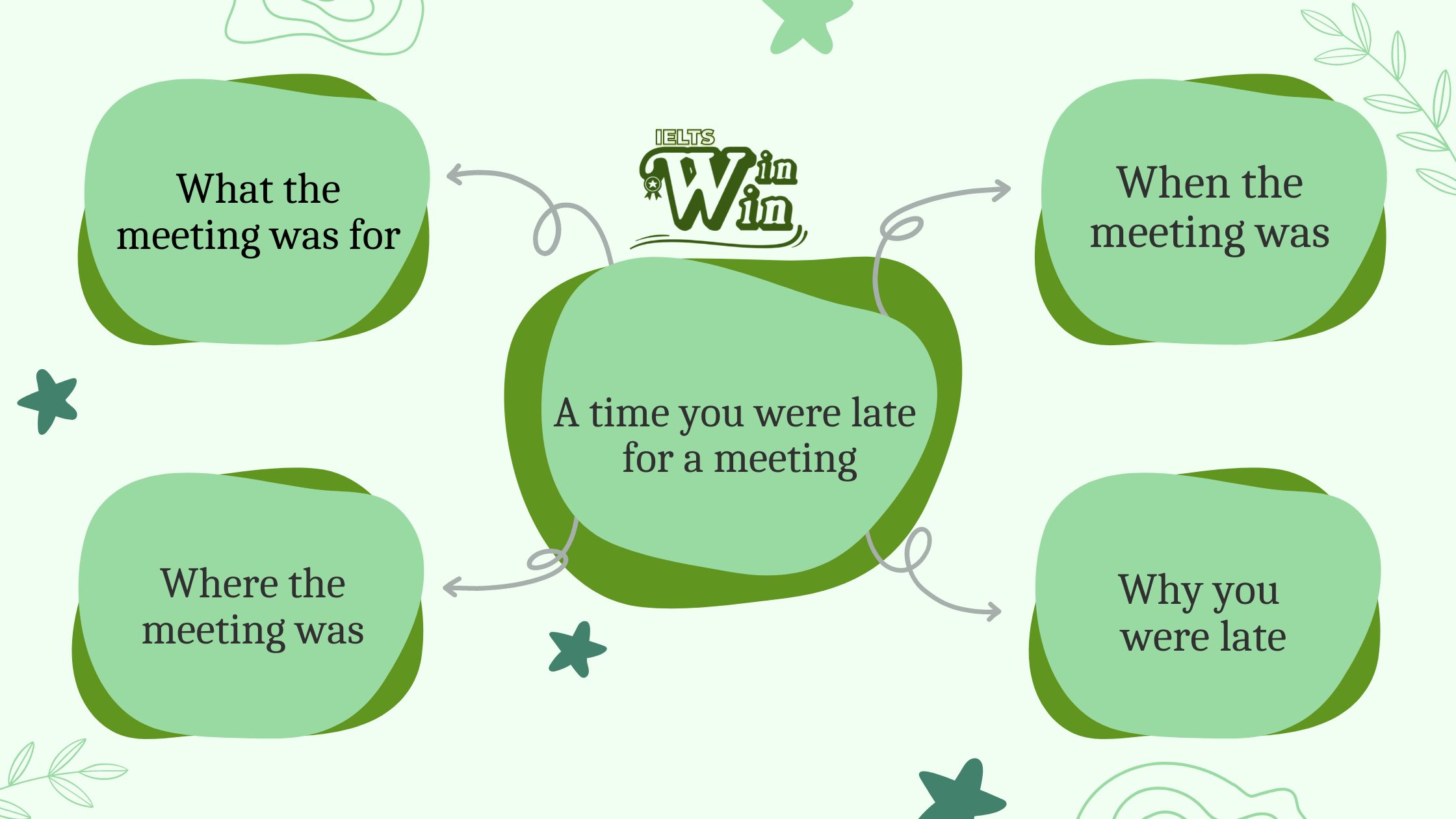✨Part 2: Describe a time you were late for a meeting.
You should say:
- what the meeting
- was for when the meeting
- was where the meeting was
- explain why you were late
I’m a very punctual person and I hate it when people show up late to a meeting or a hangout. But sadly, I made this horrible mistake at a very important meeting for my uni group project, and I still feel ashamed when I think back to it.
It was several months ago when our group had to submit our final project to the professor, so we decided to gather one last time to nitpick every single mistake. We agreed to meet at a coffee shop near my uni at around 9 a.m. The night before the meeting, I pulled an all-nighter to finish my part, so everyone could help me fix it the next morning. I went to bed around 2 a.m., but my alarm didn’t go off, and I ended up oversleeping. When I finally realised that I was an hour late for the meeting, my friends had already tried calling me multiple times. I quickly got dressed and rushed out of the house, but to add insult to injury, I completely lost my way due to my terrible navigation skills. I had to stop several times to ask for directions from nearby drivers which was time-consuming and finally showed up at the meeting 2 hours after it started. Fortunately, my team members were quite forgiving and didn’t hesitate to rediscuss what they had covered in the time I was absent. I apologised for my mistake and to make up for my absence, I promised to pay for that day’s lunch.
Although I didn’t have to pay too high of a price for my mistake, it was still a foolish one. This experience reminded me to always be punctual, as making others wait is a terrible thing to do.
- Punctual: /ˈpʌŋktʃuəl/ (adj) - đúng giờ, đúng hẹn
- Nitpick: /ˈnɪtpɪk/ (v) - chú ý đến những chi tiết nhỏ, phân vân về những thứ không quan trọng
- Pulled an all-nighter: /pʊld ən ɔːl ˈnaɪtər/ (v) - thức cả đêm để làm việc, học tập
- Oversleeping: /ˌəʊvəˈsliːpɪŋ/ (n) - ngủ quá giờ, ngủ nhiều hơn cần thiết
- Add insult to injury: /æd ˈɪnsʌlt tu ˈɪndʒəri/ (v) - gây tổn thương, làm tổn thêm vết thương cũ
PART 3
✨What kinds of activities do you consider a waste of time?
Numerous activities are often regarded as frivolous. These activities don't give you any benefit, but they can eat up a lot of your time. Like when a kid spends hours doing something unproductive instead of finishing their homework - that's a total waste of time. Or waiting in line forever only to find out you didn't get what you wanted - that's also a waste of time.
- Frivolous: /ˈfrɪvələs/ (adj) - vô nghĩa, không có giá trị
✨What usually makes people feel pressured?
I'm pretty sure that social criticism, time limits, and competition are the usual suspects that put people under pressure. Firstly, when friends, family, or society have too many expectations and judgments, people can feel pressured to conform to certain norms. Secondly, having a limited amount of time to complete a task can easily stress people out, making it hard to finish on time. And finally, when surrounded by lots of competitors in life, many find it tough to perform at their best to stay ahead of others, which eventually leads to pressure.
- Social criticism: /ˈsəʊʃl ˈkrɪtɪsɪzəm/ (n) - phê phán xã hội
- Competitors: /kəmˈpetɪtəz/ (n) - đối thủ cạnh tranh
✨Do you think young people or old people are better at managing time?
Well, to me, age doesn't necessarily determine whether you're a good time manager or not. Time management skills can be learned and improved, just like many other skills. Maybe as people age, they gain more experience and get better at this skill, but overall, it depends on each individual's schedule, personal interests, and activities. Some younger people are excellent at managing their time because they’re well aware of what they should do and benefit from top-notch time management tools on their technologies. On the other hand, some older people may struggle with this.
- Top-notch: /ˌtɒp ˈnɒtʃ/ (adj) - tuyệt vời, xuất sắc
✨Why do young people waste more time than old people?
I don’t know why this question sounds stereotypical to me, probably because I’m a youngster, but time-wasting behaviours shouldn’t only be limited to young people. Young individuals may have differing priorities and responsibilities, such as fewer work or family obligations, which can create the perception of having more free time. But, looking on the bright side, some of the activities that older individuals may deem wasteful could serve a purpose for young people, such as making mistakes and learning from them to develop better time-management skills and gain a deeper appreciation for life.
- Stereotypical: /ˌsteriəˈtɪpɪkəl/ (adj) - có tính chất khuôn mẫu, định kiến
- Youngster: /ˈjʌŋstər/ (n) - thanh niên, trẻ em
- Obligations: /ˌɒblɪˈɡeɪʃənz/ (n) - nghĩa vụ, trách nhiệm
- Perception: /pəˈsepʃn/ (n) - sự nhận thức, quan điểm
- Deem: /diːm/ (v) - cho rằng, coi như
✨How can people manage their time better?
Although different people may have different approaches to managing their time, I believe that the most effective way is to establish a plan and follow through with it. It's important to clearly identify priorities and tackle them first, before moving on to less critical tasks. Allocating an appropriate amount of time for each task is crucial to avoid excessive time spent on unimportant activities. This can be achieved manually using planner books or through the use of digital planners such as Notion, which offer greater efficiency and convenience.
- Tackle: /ˈtækəl/ (v) - giải quyết, giải quyết vấn đề
- Allocating: /ˈæləkeɪtɪŋ/ (v) - phân bổ, cấp phát
- Excessive: /ɪkˈsesɪv/ (adj) - quá mức, vượt quá giới hạn.
Xem thêm các bài viết về Speaking Part 2 và 3 ở đây bạn nhé
Đừng ngần ngại để lại thông tin hoặc liên hệ với chúng mình qua địa chỉ sau đây để IELTS WinWin có thể hỗ trợ tốt nhất cho bạn nhé!
Địa chỉ: 118 Nguyễn Xuân Khoát, P. Tân Thành, Q. Tân Phú, TP. Hồ Chí Minh.
Fanpage: IELTS WinWin
Zalo: 0965 439 239 – 085 301 8788
Website: ieltswinwin.com



